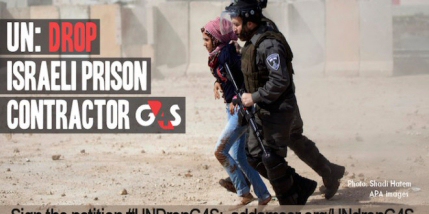The United Nations Children’s Fund (UNICEF) in Jordan has ended its contract with G4S following a campaign by BDS activists in the country and across the world over the company’s role in Israel’s detention and torture of Palestinian political prisoners and other Israeli human rights violations.Guman Mussa, the Arab World campaigns coordinator with the Palestinian BDS National Committee (BNC), the largest coalition in Palestinian civil society leading the global Boycott, Divestment and Sanctions (BDS) movement, welcomed the move:
“UNICEF did the right thing by ending its contract with G4S as the company supports violations of rights of Palestinian children including their routine torture in Israeli jails. This is an important decision in accordance with the values of human and children’s rights espoused by UNICEF. We urge the United Nations, its Secretary General Ban Ki Moon and all UN agencies contracting G4S worldwide to follow the lead of UNICEF and UNHCR in Jordan and immediately end their contracts with G4S.”
“We welcome this news and congratulate Jordan BDS for their persistence and hard work. We salute all campaigners around the world involved in the Stop G4S campaign,” Mussa added, according to the PNN.
Over the past year, campaigners have been urging the UN and its agencies to end their contracts with G4S over its complicity in Israel’s regime of settler colonialism, occupation and apartheid.
G4S, which is a large British security company, provides equipment and services to Israeli prisons at which Palestinian political prisoners, including children, are held without trial and subjected to torture.
According to the BDS Movement website, “by helping Israel to run prisons and “interrogation centres”, G4S is participating in Israel’s use of torture and mass incarceration of more than 6,000 Palestinians as a way to discourage Palestinians from resisting Israel’s regime of occupation, settler-colonialism and apartheid.”
G4S also has contracts with the Israeli government to provide equipment and services to checkpoints and the apartheid wall, as well as crossings that enforce the siege of Gaza.
It was also involved in the construction of a 23 hectares Training Center for the Israeli Police, which it will help to run.
G4S has provided services to various UN agencies in Jordan including UNICEF and UNHCR, both of whom no longer have contracts with occupation and apartheid profiteer G4S.
UNICEF’s decision comes after a year-long concerted and creative campaign which included meetings, letters, protests and social media actions that called upon the UN and its agencies both locally and internationally to end its contracts with G4S, worth $22 million globally, due to the firm’s complicity in Israeli human rights abuses.
Other UN bodies in Jordan including United Nations Development Program (UNDP), World Food Program (WFP), and United Nations Office for Project Services (UNOPS) still have contracts with the firm.
Last month, a Jordanian coalition formed to defend the political prisoner, administrative detainee and hunger striker Mohammad Al-Qeeq, demonstrated outside UN offices in Amman.
The coalition submitted a statement that was signed by 58 Jordanian organizations, unions and major political parties t demanding the UN to intervene to save the life of Al-Qeeq and as well as to end its contracts with the security firm G4S for its role in the Israeli occupation.
A report approved by the UN General Assembly in 2012 by the UN special rapporteur on Palestine, Richard Falk, urged a boycott of G4S over its role in Israeli human rights violations.
Yazid Halaseh, member of the Jordan BDS movement, said:
“We are delighted by this news. We will continue campaigning to demand an end to all UN agency contracts with G4S until the firm stops profiting from occupation and apartheid. The United Nations should simply ban this notorious firm from its procurement process because it is profiting from the Israeli settler-colonial project, ethnic cleansing of the Palestinians and apartheid policies. These are all violations of UN resolutions, basic principles of human rights and international law.”
Search IMEMC: ‘boycott’

